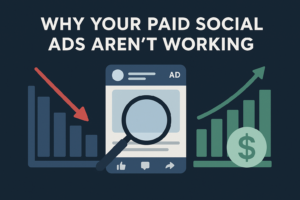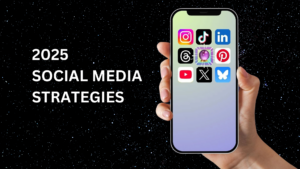What is Programmatic Advertising?
This is a question that we get when we are reviewing paid media plans with clients. What is programmatic advertising? It’s a great question and I turned to paid media expert Tom Burke to answer that question. This is what he had to say.
Programmatic advertising is the use of automated technology for media buying (the process of buying advertising space), as opposed to traditional (often manual) methods of digital advertising. Programmatic media buying utilizes data insights and algorithms to serve ads to the right user at the right time, and at the right price.
In other words, as Tom points out, programmatic advertising is simply another way to buy advertising or media.
How is buying programmatic advertising different from traditional ad buying?
With traditional or direct ad buying you purchase advertising space on a website or in a traditional publication directly from the publisher.
You negotiate the price, pick the placing and the date the ad will run, and for how long the ad will be shown to the publisher’s readers. It involves people talking with people, and the process can take time, as ad copy is sent back and forth for approval. Results are calculated manually and provided to the buyer when they become available. Ads are optimized manually based on the data.
The most common example of traditional ad buying is buying ad space on a site like the Wall Street Journal, New York Times, or Boston.com. Everyone who visits these websites will see your ad, regardless of whether they could be interested in your product/service or not.
Purchasing programmatic advertising, on the other hand, is very similar to Facebook or Google where the ads are bought and sold through an automated process through a dashboard. Real-time optimization occurs and KPI data are available as it comes in. There is no need to interact with any salespeople at the publishers.
Unlike in the first example, your ad is only shown to the website visitor who matches the behavioral or demographic characteristics of your ideal customer, increasing the likelihood that they will click on your ad.
Programmatic advertising misconceptions
One of the common misconceptions about programmatic advertising is that the quality of the ad inventory is not top tier quality.
That is completely incorrect because today you can buy almost any type of ad programmatically. In the last twelve months, companies we have worked with, have bought TV advertising on Hulu programmatically. They have bought streaming audio on both Pandora and Spotify programmatically. And they have bought ads on major websites like the New York Times, Wall Street Journal and Bloomberg.com all programmatically.
When you can target your ad buy so that your ad is only shown to someone who matches your ideal customer profile, why would you not be using programmatic advertising?
Recent Posts

Paid Social Media ROAS
Why Your Paid Social Media Ads Aren’t Delivering ROAS—And How to Fix It You’ve invested in paid social media advertising. You’ve committed budget, time, and

Search Visibility
How to Improve Search Visibility and Drive More Organic Traffic For many businesses, low search visibility is a persistent challenge that directly impacts their ability

Generative Engine Optimization (GEO)
Generative Engine Optimization (GEO): The Future of Search and How It Differs from SEO As digital marketing continues to evolve, search is undergoing a radical

Best Practices for Building a Brand Presence on YouTube
Updated Best Practices for Building a Brand Presence on YouTube (2025) YouTube continues to be a dominant platform for video content, offering businesses unparalleled opportunities

Best Practices for Building a Brand Presence on Instagram
Best Practices for Building a Brand Presence on Instagram (2025) Instagram continues to dominate as a platform for visual storytelling, brand development, and audience engagement.

Social Media Strategies
10 Proven Social Media Strategies to Dominate in 2025 In the dynamic landscape of 2025, mastering social media requires a strategic approach tailored to evolving